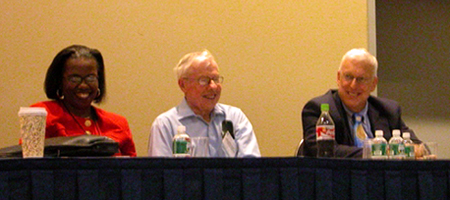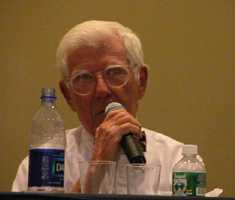![[Fenichel's Current Topics in Psychology]](http://www.fenichel.com/CTparent.jpg)
![[Fenichel's Current Topics in Psychology]](http://www.fenichel.com/CTparent.jpg)
American Psychological Association
113th Annual Convention - Washington, DC
August 18-21, 2005
These edited reports were originally posted to the Current Topics, Therapy Online, and Cyberpsychology list-servs, August 2005.
2005 Convention Highlights:
Opening | Pioneers of Behavior Therapy | Distinguished Elders of Psychotherapy | Legends Discuss Psychology | Online Clinical Work | Town Hall Meeting
![[color line]](http://www.fenichel.com/moveline.gif)
"Asynchronously Live" from Washington, D.C.
============
*DISCLAIMER*
I was very careful to take accurate notes during these presentations, using handouts and/or photos of graphics to verify my notes. While I believe these are accurate, literal real-time notes, I apologize for any errors or typos, or for reporting anyone else's unintentional mis-statement. I will be happy to immediately correct any errors and I welcome presenters' submission of additional online references which might be included in these reports. Thanks, and... Enjoy!
=============
![[Washington, DC]](http://www.fenichel.com/dc-mini.jpg) Asynchronously Live from Washington.....
Asynchronously Live from Washington.....
![[Pioneers in Behavioral Psychotherapy]](http://www.fenichel.com/pioneers.jpg) |
| Photo by Fenichel: Pioneering the Behavior Therapies---Lessons for the Future |

![[APA Convention - Panel on Online Mental Health]](http://www.fenichel.com/ismhopanel05.jpg) |
| CLINICAL TOPICS ON THE INTERNET -- Working in the Online Medium (Photo by Fenichel) |
![[Distinguished Elders of Psychotherapy]](http://www.fenichel.com/elders.jpg) |
| Photo by Fenichel: Distinguished Elders Appraise the Field of Psychotherapy |
Symposium:
Distinguished Elders Appraise the Field of Psychotherapy --
Perils and Possibilities
Here is some of what was discussed here at this symposium of Distinguished Elders speaking their true thoughts about the history and state of psychology and psychotherapy. The chair told the panel that they should feel free to "say what you *really* want to say -- you are encouraged to be provocative, challenging, and even (I hope) outrageous".. The format was 16 minutes each followed by a one-minute spontaneously "huh" response from another panelist.
Arnold Lazarus, "father of behavior therapy", went first.
[Remember: the panelists were *asked* to be a bit provocative, irreverant, even outrageous, as they'd earned the right and this was largely an informal discussion rather than presentation of research. This is intended to provide the psychology student or practitioner with a real sense of "being there" with some of the legends "telling it like it is" for them.]
Lazarus reflected that in 1959 the field of psychology and mental health was very much oriented towards the psychosocial, and went through many changes, so much so that we've gotten to a point now where it might be construed that "the profession is going down the tubes. We are the only organization in history to be censured by Congress. Political correct-niks have taken over the APA! But our therapists have done no wrong. In fact, most therapists are practicing so defensively that consumers are short-changed, as therapists do not know the difference between anecdote and evidence. I was speaking with [Gerald] Davison about this: Case studies can prove nothing, even if you use an ABA design. I must concede, you can learn something, like innovative methods, which you can then test. [But in general] we are all victims of 'placebo' and suggestion, and thus prone to superstitious behavior."
Lazarus recalled one "cult leader" showing off the power of his procedure. He took a woman terrified of being looked at, and put her on a stage in front of an audience. "How anxious are you on a scale of 1 to 10?" Ten. He had her relax and her anxiety level over time went down, to 8, 6, 3, and 2. The presenter then concluded, "You see, in 1/2 hour we went from 10 to 2". Case closed. Lazarus, a former student of Wolpe -- who *invented* systematic desensitization -- raised his hand to ask a question at that point: "Where was your control? If you had her up for half an hour reciting nursery rhymes, might not the results have been similar?"
Another example was offered, of how practice is often half-baked, with variable results, giving the entire field a bad name. Take a person with OCD. "You can do all the right procedures. If the methods are done without the context of rapport, they'll be useless. I shouldn't be up here saying this; it's Psych 101!"
Lazarus seems rather unimpressed with the method of Carl Rogers (at least, empirically speaking). "Rogers used to give the same treatment to everybody. Some people don't want warmth and empathy". (That's what he means by the need to have context.)
"What is really important aside from knowing the treatment of choice for a particular client and circumstances?... Adherence and compliance. Case in point... " A mother, father, daughter and son-in-law are all being seen in family therapy. It's like World War III. There is also a rift between the son-in-law and his (absent) brother-in-law. The daughter interrupts a heated exchange between her father and her husband to point out that at base they are all 'decent good people at heart'. They all strongly agree with this personification. Borrowing a strategy from hypnosis where a client after a trance induction may say that he felt a 'delightful sense of being light and cool'in which case in subsequent sessions a good therapist will use that expression to facilitate matters, the term 'decent good people at heart' was made a focal point. Turning to this very conflict-ridden group, the therapist tells them that he considers each one 'decent and good at heart'. He then says to the son-in-law, 'My impression is that you're not a nasty S.O.B. but sometimes you act like one. The client replies, 'you're right'. So emphasis was placed on maximizing the decency and goodness, which galvanized rapport. The session ended with the four people apologizing for their previous untoward behaviors and hugging each other." The point, in case it's lost in translation, is that things like rapport and context are key to successful therapy *along* with techniques which are shown to be effective.
Nevertheless, it must be recognized how often there is a "mixing up anecdotes with evidence. This results in giving causal connections to spurious correlations and making confusion worse confounded."
Case example - a very anxious woman seeks treatment from Lazarus after being psychoanalyzed, then seeing a gestalt therapist, an existential therapist, and several other counselors and clinicians, all to no good effect. Lazarus did his utmost to help her but also failed. He ran into her months later and asked how she was. "Doing great!" How? She had consulted a naturopath who said her anxiety was due to poisons in her colon. He gave her colonic lavages (enemas) which allegedly removed the toxins. The question is, why did this prove effective whereas all other methods had failed? The most parsimonious answer is that it probably addressed her own phenomenological understanding of what could cause emotional upsets and addressed it in a manner that made perfect sense to her."
Well, Lazarus said with a smile, he had sought to arouse some sort of reaction among the panel and audience (as instructed), and hoped he succeeded. The one minute reply, by Luciano L'Abate: "I hope to grow up to be just like Lazarus. You cannot rely on one modality. Thanks to Lazarus for laying that out!" [Lazarus is perhaps best known for his "multimodal therapy".]
L'Abate, playfully chided earlier for his Godfather imitations (he has an Italian accent), now had his turn, roasting psychology and also sharing some of his concerns. "What I like about psychology: Many of us make more money than we thought possible. Some of us forget to go to schools of therapy and are thus 'eclectic', but it's possible to make a good living anyway! What I don't like: Psychotherapy essentially is based on words. Words can be distorted, forgotten, and can be distractions. Words are extremely valuable, and not replicable. Each of us is a school of therapy. There is no structure, so how can we link talk to a theory?" Meanwhile, "public institutions are overcrowded, and millions go unhelped. At least 2 million inmates languish in institutions and cannot be helped by talk. And the handicapped, the military, the missionary families around the world... How can we talk to all the people who need help? There are 3 ways I'm trying to improve the situation."
1. L'Abate is working with a colleague in Italy. [Pausing to poke fun at the mispronunciation of his name when he had been roasted earlier, he now pointed out "It's Lu-CHI-ano", adding that Italy is a place shaped like a boot, incidentally.] He and his colleague are "looking at sentences which have strong psychological impact" and underscored how "each of us can recall particular key statements - by professors, for example -- and these become, call it mantra... "
2. "Use of written homework assignments and workbooks." He cited a 2002 study which was very convincing in describing how use of workbooks improved "efficiency and efficacy of treatment".
3. Thirdly he's exploring "how to link evaluation to treatment", a huge area of importance. For example, he might choose to use a Beck inventory and assign a task where the client had to "define each term, give 2 examples, and how they apply to YOU". [I like how this overlaps with Lazarus' emphasis on context and personal meaning!]
After 25 years of practice utilizing workbooks with individuals (10 years) and families/couples (15 years) L'Abate realized "I was convincingly wrong". More sessions would be needed with families and couples using workbooks, not less. "But another controlled study showed workbooks lessen recidivism [outpatient]. Context is important."
"Bottom line: We can change behavior using written work. Another aspect is: In 20 years what do you think we're going to do with the children now using the Internet? You think they'll want to talk? Twenty years from now we're going to have to use the Internet."
There was a bit more to his presentation (including his suggesting the development of "psychological vaccine") and the next speaker espoused the "Chauncey Gardener" model : "Be there", with a second suggested guideline as well: "Don't panic in the face of severe pathology".
----
One heads up - several of these luminaries suggested reading the book, Blink. And one of the panel presented a tongue in cheek poem (the kind Albert Ellis would enjoy), called "Weary of Theory". And a mantra was shared too: "Believe your experience".
----
Very special thanks to Dr. Arnold Lazarus who has generously reviewed the above and helped immeasurably by amplifying and clarifying his comments, which were at times quite difficult to hear due to the poor acoustic qualities in the room.
![[APA 2005 Town Hall Meeting]](townhall05.jpg)

